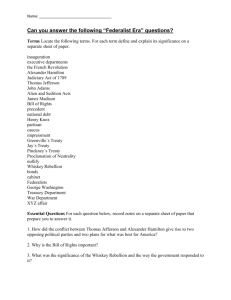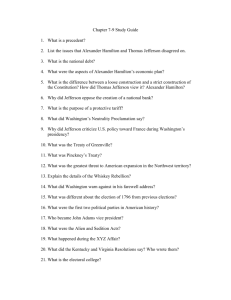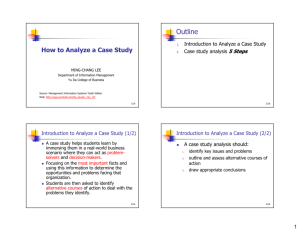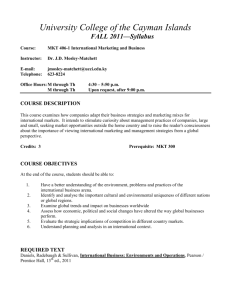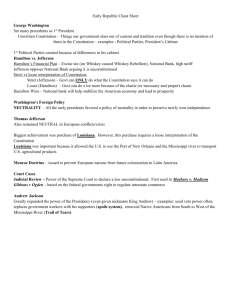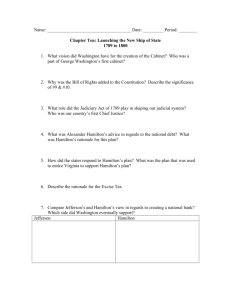Thomas Jefferson
advertisement
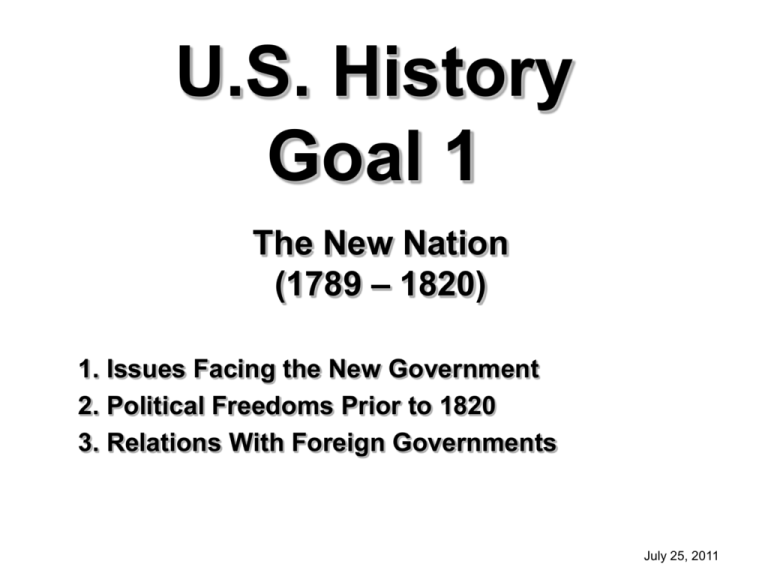
U.S. History Goal 1 The New Nation (1789 – 1820) 1. Issues Facing the New Government 2. Political Freedoms Prior to 1820 3. Relations With Foreign Governments July 25, 2011 I.Ia Issues Facing the New Government • A functioning government had to be created from scratch! • The Constitution and the Bill of Rights • Articles of Confederation (1781) • U.S. Constitution (1787) • Article I: Legislative Branch • Article II: Executive Branch • Article III: Judiciary Branch • Bill of Rights (1791) • 10th Amendment • The Judiciary Act of 1789 • established the federal court system and the authority of the Constitution • John Jay (first Chief Justice) I.Ia Issues Facing the New Government Washington’s First Cabinet Secretary of State Thomas Jefferson Secretary of Treasury Alexander Hamilton Secretary of War Henry Knox Attorney General Edmund Randolph I.Ia Issues Facing the New Government Articles of Confederation Constitution Levying taxes Congress could request states to pay taxes Congress has the right to levy taxes on individuals Federal courts No system of federal courts Court system created to deal with issues between citizens and states Regulation of trade No provision to regulate interstate trade Congress has the right to regulate trade between states Executive No executive with power, President of U.S. merely presided over Congress Executive branch headed by President who chooses Cabinet and has checks and balances of power Amending document 13/13 needed to amend Articles 2/3 of both houses of Congress plus ¾ of state legislatures or national convention Representation of states Each state received one vote regardless of size Senate – 2 votes; House of Representatives – based on population Sovereignty Sovereignty resided in states Constitution is the supreme law of the land Passing laws 9/13 needed to approve legislation 50% plus 1 of both houses plus signature of President I.Ia Issues Facing the New Government 1. What was the first governing document of the United States? 2. What brought about the creation of the Constitution? 3. What brought about the creation of the Bill of Rights? 4. What does the Bill of Rights add to the Constitution? 5. Who wrote the first draft of the Constitution? 6. What are the first three Articles of the Constitution? 7. What was the significance of the Judiciary Act of 1789? 8. Who was the first Chief Justice of the Supreme Court? 9. Who composed Washington’s first Cabinet? 10. What is the primary difference between the Articles of Confederation and the Constitution? I.Ia Issues Facing the New Government • The national debt was our nation’s greatest problem. • Hamilton’s Economic Plan • excise tax on whiskey • tariffs • national bank • assumption • Compromise of 1790 • Hamilton, Madison & Jefferson • assumption • capital to be in the South • Whiskey Rebellion (early 1790s – 1794) • against excise tax on whiskey • showed the Constitution was stronger than the Articles of Confederation Alexander Hamilton I.Ia Issues Facing the New Government Hamilton’s Plan for Restructuring Debt Action Result Lasting Legacy Pay foreign debt and interest in full Restore national credit Established United States as trustworthy Federal government assumes state debts Bring stability to country; stimulate economy Unified country Impose whiskey tax and tariffs Pay debts and increase manufacturing Established precedent of nation paying its debts Create national bank and currency Help government regulate economy and commerce; generate income through loans Created model on which today’s Federal Reserve System is based I.Ia Issues Facing the New Government 1. What were the four main components of Hamilton’s economic plan? 2. Who were the players and what were the components of the Compromise of 1790? 3. What was the Whiskey Rebellion and what was its significance? 4. Why did the Democratic-Republicans oppose Hamilton’s economic plan? 5. What was the greatest problem facing the United States? I.Ia Issues Facing the New Government I.Ia Issues Facing the New Government • Citizen Genet Affair (1893) • Edmond Genet • Washington’s Farewell Address (1796) • avoid permanent alliances with foreign nations • good government is based on morality and religion • political parties are bad • sparing use of government borrowing • Election of 1796 • John Adams (Federalist) • Thomas Jefferson (Democratic-Republican) George Washington I.Ia Issues Facing the New Government 1. Why did Washington run for a second term as president? 2. What were four components of Washington’s Farewell Address? 3. Who was Edmond Genet, and why did he come to the U.S.? 4. Discuss the Election of 1796? 5. Though Washington opposed political parties, to which party did his beliefs mostly align? 6. List some precedents set by Washington that are still followed today. I.Ib Issues Facing the New Government • The Rise of Political Parties • Federalists • “laissez-faire” economics • Democratic-Republicans • Conflicts Between Federalists & Democratic-Republicans • Alien Act (1798) • immigrants could be deported for criticizing the government • Sedition Act (1798) • made it illegal to speak out against the government without proof • Virginia & Kentucky Resolutions (1798 & 1799) • Doctrine of Nullification • states could nullify laws it considered unconstitutional I.Ib Issues Facing the New Government 1. What were the Alien & Sedition Acts, and what was their purpose? 2. What were the Virginia & Kentucky Resolutions and what was their purpose? 3. What is the Doctrine of Nullification? 4. What were the first two American political parties? 5. What is the purpose of a political party? 6. What is “laissez-faire” economics, and which political party supported it? I.Ib Issues Facing the New Government Federalist Democratic-Republicans • Alexander Hamilton • Thomas Jefferson • loose interpretation • strict interpretation • implied powers • enumerated powers • strong central government • strong state governments • favored businesses and banks • favored farmers (agrarian) • distrusted the common man • trusted the common man • favored Great Britain • favored France I.Ib Issues Facing the New Government Federalist Democratic-Republicans • __________________________ • __________________________ • __________________________ • __________________________ • _______________________ • _______________________ • __________________________ • __________________________ • __________________________ • __________________________ • __________________________ • __________________________ • __________________________ • __________________________ I.Ib Issues Facing the New Government • The Election of 1800 • John Adams (Federalist – 65 votes) • Thomas Jefferson (Democratic-Republican – 73 votes) • Aaron Burr (Democratic-Republican – 73 votes) • 12th Amendment • John Marshall and the “Midnight Judges” • Marbury v. Madison • “judicial review” • constitutional vs. unconstitutional William Marbury James Madison I.Ib Issues Facing the New Government 1. Discuss the candidates and outcome of the Election of 1800. 2. What was the significance of the Election of 1800? 3. What is the 12th Amendment? 4. What were the “Midnight Judges,” and how did they come about? 5. Discuss Marbury v. Madison. 6. What is “judicial review,” and what is its significance today? I.Ib Issues Facing the New Government • The Hartford Convention of 1814 and the Decline of the Federalists • Hartford Convention • Federalists • secession • Barbary War • 1801-1805 • Thomas Jefferson I.Ib Issues Facing the New Government • Louisiana Purchase • Thomas Jefferson • unconstitutional? • 1803 • from France • Napoleon Bonaparte • almost doubled the size of the U.S. • 828,800 sq. mi. • less than 3 cents per acre Thomas Jefferson I.Ib Issues Facing the New Government I.Ib Issues Facing the New Government • Lewis & Clark Expedition • May 1804 – September 1806 • Meriwether Lewis • William Clark • Sacajawea • Corps of Discovery • Northwest Passage??? • to discover new flora and fauna • 7,689 miles I.Ib Issues Facing the New Government I.Ib Issues Facing the New Government 1. What was the Hartford Convention, and how did it affect the Federalist Party? 2. What was the Barbary War, and what is its significance in American history? 3. What was the significance of the Louisiana Purchase, and how did the U.S. acquire it? 4. What dilemma did Thomas Jefferson face concerning the Louisiana Purchase? 5. What was the Lewis & Clark Expedition? 6. What was the purpose of the Lewis & Clark Expedition? I.2 Political Freedoms Prior to 1820 • Suffrage and the Status of Women • Abigail Adams • suffrage • could inherit property • Native Americans • Battle of Fallen Timbers • Little Turtle / “Mad Anthony” Wayne • Treaty of Greenville (1794) • Battle of Tippecanoe (1811) • Tecumseh / William Henry Harrison • African-Americans and Slavery • emancipation • Eli Whitney • cotton gin • “necessary evil” I.2 Political Freedoms Prior to 1820 1.Who is remembered for the phrase “Remember the ladies.”? Why? 2. Define suffrage. 3. What rights did women have early in our nations history? 4. Who were the leaders in and what were the results of the Battle of Fallen Timbers? 5. What was the Treaty of Greenville? 6. Who were the leaders in and what was the significance of the Battle of Tippecanoe? 7. What was the U.S. government’s policy towards Native Americans in the late 1700s and the early 1800s? 8. Who invented the cotton gin, and what was its significance? 9. Define emancipation. I.3 Relations With Foreign Governments • Great Britain and France • Proclamation of Neutrality (1793) • impressing seamen • Jay’s Treaty (1794) • XYZ Affair (1798) • Quasi War (1798-1800) • Convention of 1800 • The Embargo Act of 1807 • Embargo Act • Non-Intercourse Act (1809) • Macon’s Bill No.2 (1810) John Adams I.3 Relations With Foreign Governments 1. What was the Proclamation of Neutrality? 2. What nation was impressing American seamen, and how did it affect the relationship between the two countries? 3. Discuss Jay’s Treaty. 4. What was the XYZ Affair, and how did it affect the relationship between the two countries? 5. What was the Quasi War, and what officially ended it? 6. What was the Embargo Act of 1807, what led to it, and was it successful? 7. What was the Non-Intercourse Act? 8. What was Macon’s Bill No.2? I.3 Relations With Foreign Governments I.3 Relations With Foreign Governments I.3 Relations With Foreign Governments The War of 1812 (1812-1814) • “War Hawks” • Causes: The British… • interfered with foreign trade. • impressed American seamen. • supported Native American attacks on American settlers. Impressment of American seamen I.3 Relations With Foreign Governments The War of 1812 (1812-1814) • Invasion of Canada (failed) • British blockade of our ports • Some U.S. naval success on the Great Lakes • Defeat of Native Americans • Battle of Horseshoe Bend (Mar 1814) • British burn Washington, D.C. (Aug 1814) • Ft. McHenry – Francis Scott Key (Sept 1814) • Treaty of Ghent (Dec 1814) • prewar boundaries • impressment not stopped • Battle of New Orleans (Jan 1815) • Andrew Jackson hero Ft. McHenry flag 30’ X 43’ I.3 Relations With Foreign Governments • Consequences of the War of 1812 • U.S. and G.B. returned to their original boundaries • U.S. won respect of other nations • U.S. nationalism grew • Federalists lost creditability and disbanded • U.S. manufacturing grew • Spain • Pinckney’s Treaty (1795) • acquired Use of the Mississippi River and New Orleans from Spain • Adams-Onis Treaty (1811) • U.S. acquired Florida from Spain War of 1812 I.3 Relations With Foreign Governments 1. What were “War Hawks”, and from what regions of the U.S. were they from? 2. What were the causes of the War of 1812? 3. What happened to Washington, D.C. during the war? 4. What officially ended the War of 1812? 5. What were consequences of the Treaty of Ghent? 6. What was significance about the Battle of New Orleans? 7. List five consequences of the War of 1812. 8. What was Pinckney’s Treaty? 9. What was the Adams-Onis Treaty? 10. What is significance of the Louisiana Purchase, The Treaty of Greenville, Jay’s Treaty, Pinckney’s Treaty, and the Adams-Onis Treaty?
